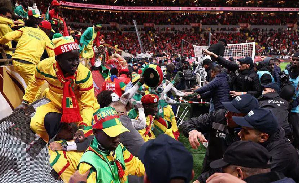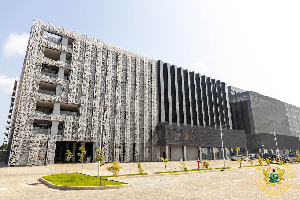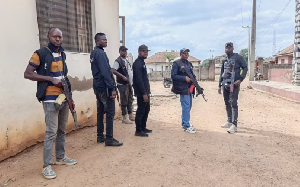The planned debate of the ruling National Patriotic Party (NPP) presidential candidates as the major mark of the NPP-USA 2007 Congress on October 20, 2007 in Dallas, Texas, USA raises the increasing influence of transnational Ghanaians on their homeland more than before. In the last couple of years, prominent Ghanaian politicians, businessmen and women, and traditional rulers have been making the rounds globally interacting with transnational Ghanaians for all sorts of deals and connections ? all boiling down to the development of Ghana. This has played into the fact that either by accident or providential design, there are almost 3 million Ghanaians abroad, and growing, who are critical part of the key sustenance of Ghana
? the Bank of Ghana, the central bank, and the World Bank report that transnational Ghanaians transmit well over US$4.3 billion in 2007 to Ghana, an increase from US$400 million in 2001.
For sometime, its transnational group, unknown to most Ghanaians, has been subtly influencing the affairs of their homeland, especially its democratic and economic growth. In the years leading to the dawn of the on-going democratic dispensation in 1992, the transnational Ghanaian lobbies in Washington, London, Berlin, Paris and other Western capitals had cajoled and talked the Western world and its institutions to put pressure on the Jerry Rawlings military junta to democratize, and if it looses the general elections, hand-over power to the opposition. Oiled more by the various facets of globalization, especially the economic and the technological, transnational Ghanaians, sometimes called ?diaspora Ghanaians,? have been fully appropriating the elements of globalization to either direct or re-direct events back home. To acknowledge and fully support them, in August, Mr. Stephen Asamoah Boateng, Tourism and Diasporan Relations Minister, launched the Ghana Opportunity Network (GoNET), a website that provides information to transnational Ghanaians to know as fully as possible all developments back home.
It is in this interplay of information flow that the NPP presidential aspirants, who have until November 22, 2007 to file their papers and be scrutinized by the party?s executives, are to go on October 20, 2007 to Dallas, Texas to debate party policy issues. As part of the scrutiny, in transnational terms, the Dallas debate, which is the first of its kind in Ghana?s emerging democracy ? a historic feat ? is also to assess how the presidential aspirants are able to tie Ghana?s progress to globalization, especially its growing transnational population who are currently the leading contributors to Ghana?s Gross Domestic Product at almost $4.3 billion in 2007. As the organizers argue, ?Dallas will give us a peek at who these winners could be.? True to transnational values, exploiting technology ? telephony, Internet, teleconferencing, video, different mode of transportation, telecommunication, etc, etc - which has made transnationality easier and closer, the NPP presidential aspirants who travel to Dallas for the discussions will see their debate interactively played on Ghana?s TV, Internet outlets, the growing FM stations, and other media, ?so prospective voters can be their own best judges.?
As the power of transnational Ghanaians grows, politicians of all spectrums are globetrotting for all kinds of assistance, pitch-making, and endorsements. The headlines say it all from both transnational Ghanaian-based and Ghana-based mass media: ?Prof. Agyeman Badu Akosa (of the Convention Peoples Party, CPP) in UK,? ?Message From NDC Virginia Chapter,? ?Nana Ohene Ntow (of NPP) Storms Amsterdam,? ?Nkoranza MP to visit citizens abroad,? ?Dr. Nduom (of the CPP) Invited To The U.S.A,? ?New England NPP Picnic In Worcester,? ?Atta Mills (of the National Democratic Party) In Worcester, Massachusetts,? ?Atta Mills Inaugurates Virginia NDC Chapter.? As the 2008 Ghanaian general election closes in, transnational Ghanaians political activities are being felt in both sides of the Atlantic Ocean. On August 4, 2007 former President Jerry Rawlings, at a Banquet and Fundraising Dinner held at Houston, Texas by the North America Coordinating Council of the National Democratic Congress, the main opposition party, raised US$700,000.
The amount set Ghanaian political circles boiling as to how such a huge amount could have been raised, with the former Foreign Affairs Minister, Nana Akufo Addo, a leading contender for NPP flagbearership, questioning ?how only 55 Ghanaians abroad could raise a whopping US$700,000 at a day's event.? The issue isn?t the 55 NDC persons at the Banquet, the issue is if the 55 people have the ability to raise the US$$700,000, yes; it can be possible in the United States. To attract the much needed campaign contributions and boost their moral, Ghanaian political parties have been moving back-and-forth between Accra and other Western cities and towns ? some invited by their respective transnational branches, others for pure political adventurism, playing into the fact that most of the major political parties have branches overseas. Such strong links between homeland Ghanaians and transnational Ghanaians are bound to grow, sometimes controversially, as the US$700,000 NDC Houston money indicates, as the population of both sides grow, global transnational activities becomes much more sophisticated, and impacts on Ghana?s development process.
The increasing interplay of transnational Ghanaians and homeland Ghanaians is seen in the incumbent President John Kufour?s NPP regime. Not only are good number of key figures in the presidency, cabinet members and Members of parliament transnational Ghanaians, some diplomats too are such Ghana?s Ambassador to Italy and the Deputy High Commission to South Africa, are transnationals from Canada. They had immensely helped candidate Kufour in 2000 and 2004 ? in fact candidate Kufour slept at the Ghanaian Ambassador?s house in Toronto. Some Ghanaian-Americans, convinced the current Constitution is not sophisticated enough to appropriate skilled and well-connected transnational Ghanaians for Ghana?s progress, have filed legal challenges in Accra.
As the power of transitional Ghanaians grows, their influence are being felt not only in financial remittances but the broader use of information technology that transmit their activities back home and help enrich Ghana?s fledging democracy. Nowhere is transnational Ghanaians influence experienced than through the internet in particular and technology in general. Most of the prominent Ghana-oriented Internet websites are owned by transnational Ghanaians. From the most popular www.ghanaweb.com to www.modernghana.com, www.ghanadot.com to www.theghanaianjournal.com to www.thenewghanaian.com, and www.myghanareport.com, among a long list, the activities of transnational Ghanaians are transmitted back home instantly and receive home news in the same mechanism. It is from such medium and the increasing financial clout of transnational Ghanaians that their influence will grow in the coming years, helping to develop, directly or indirectly, Ghana?s progress.















